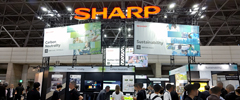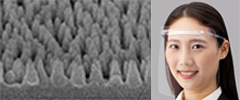The Call of Adhān from TV – Sharp’s Activity to Develop Indonesia Market
March 6, 2019
It is well known that faithful Muslims pray five times a day towards Mecca. So how do they know when to pray (salah time)? There is a call to pray, adhān, reciting “Allāhu ʾakbar (God is the greatest)” from nearby mosques to inform the start of each prayer time. However, because salah times differ according to regions, Muslims who are away from mosques need to check their salah times by themselves.
In October 2018, P.T. Sharp Electronics Indonesia released Adhān TV, Smart-TVs with Adhān Reminder, a function which recites adhān and reminds salah times. We interviewed the members involved in development of the Adhān TV this time.

Mr. Shimokobe from Asia Products Planning Division(left), and Mr. Horiuchi from Asia Sales Promotion Division (right)
-How was the idea of Adhān TV was created in the first place?
(Horiuchi)
It came from an idea by one of our sales personnel in Indonesia, that if a TV can remind salah times, the users might find it useful. Indonesia is the biggest Islamic nation in terms of population, where 87% of its 260 million people are Muslims. After developing the idea over several discussions, I brought it to Mr. Shimokobe.
(Shimokobe)
When I first learned the idea, it seemed not too difficult to realize it as timers are already equipped in LCD-TVs, but I soon learned that it was far more difficult than I thought.

-What were the challenges?
(Shimokobe)
Indonesia is a large country consisted with over 10,000 islands and spanning over 5,000 km in longitude. So we tried to create a system which calculates salah times from sunrise and sunset hours, but this was not that easy because salah time standards differ in each area. Therefore, we did a research on salah times, and input each data to our system. Because we cannot make the slightest mistake, we also asked for supervision by Islamic authority.

Setting mode of Adhān Reminder
-How are consumers reacting to Adhān TV?
(Horiuchi)
When salah time comes while watching the TV, the broadcast volume decreases automatically, and you will hear adhān calling. Customers using the TV gave us positive reactions that Adhān Reminder is not only helpful for their prayers, but also for religious education for children, since they can learn to prepare for prayers with the reminder from their TVs.
-Is there any difference in terms of sales of Adhan TVs by regions?
(Horiuchi)
So far, smart TVs with internet connectivity have been better accepted in cities, but Adhān TVs are well accepted outside of big cities. There are many mosques in cities, and the call of adhān is part of everyday life, but in areas where a large proportion of the population follows other religious beliefs, such as in Bali (Hindu) and West Timor (Christianity), there are less mosques around to announce adhān, so the concept of Adhān TV was welcomed. This was a pleasant surprise.
-We feel that sales team and product development team are working very closely.
(Shimokobe)
Yes. We receive lots of ideas from our sales team, and Adhān TV is just a tip of the iceberg. The best ideas for local-fit products come from comments and feedback from the market, and the inputs from Mr. Horiuchi and the Indonesia sales team are very stimulating and helpful.

Meeting in Indonesia
(Horiuchi)
For us, it is very helpful that the product development team is open to hear our ideas and comments. When you have products realizing your ideas, you’d sell the products with passion, and that is exactly what’s happening with the Indonesian sales team now. Their motivation is higher than ever.
-By the way, did you wish to work abroad when you joined Sharp, Mr. Horiuchi?
(Horiuchi)
Yes. Because I spent my childhood living outside of Japan, I’ve always wanted to work abroad. With the understanding of my managers, I began to work in Malaysia from my fourth year at Sharp, and in Indonesia in my seventh year. This is my 11th year at Sharp, and although my current department is based in Japan, I work in Indonesia about half of the year.

-Was there any concern for working outside of Japan?
(Horiuchi)
My first assignment was to adapt Japanese sales methods to sales teams in ASEAN countries, and I was anxious whether it would work out. So I prepared a full translation of a thick and detailed manual used in Japan, and showed it to our local team, but they skimmed through a few pages and said to me, “we will be all right!” I realized I needed to change my approach, and so I made close communication with the local members and worked together to pick up the methods that could be adapted in the region. In the beginning, I could only speak English, but now I try to speak in Indonesian as much as I can as well. It is definitely better that way to touch their heart in communication.
Sharp has been the No. 1 brand of TVs in Indonesia in terms of sales unit since 2017, and we hope to keep this position for years to come. We had a lot of trials and errors over years, but our effort has begun to pay off, which is very motivating.

-Thank you.
Adhān TV was realized by the close communication of product development and sales teams, and despite it took them a whole year to take on their challenges before release, our interviewees shared us their story somewhat with a sense of joy. We ourselves are looking forward to deliver more local-fit products in the future as well.




